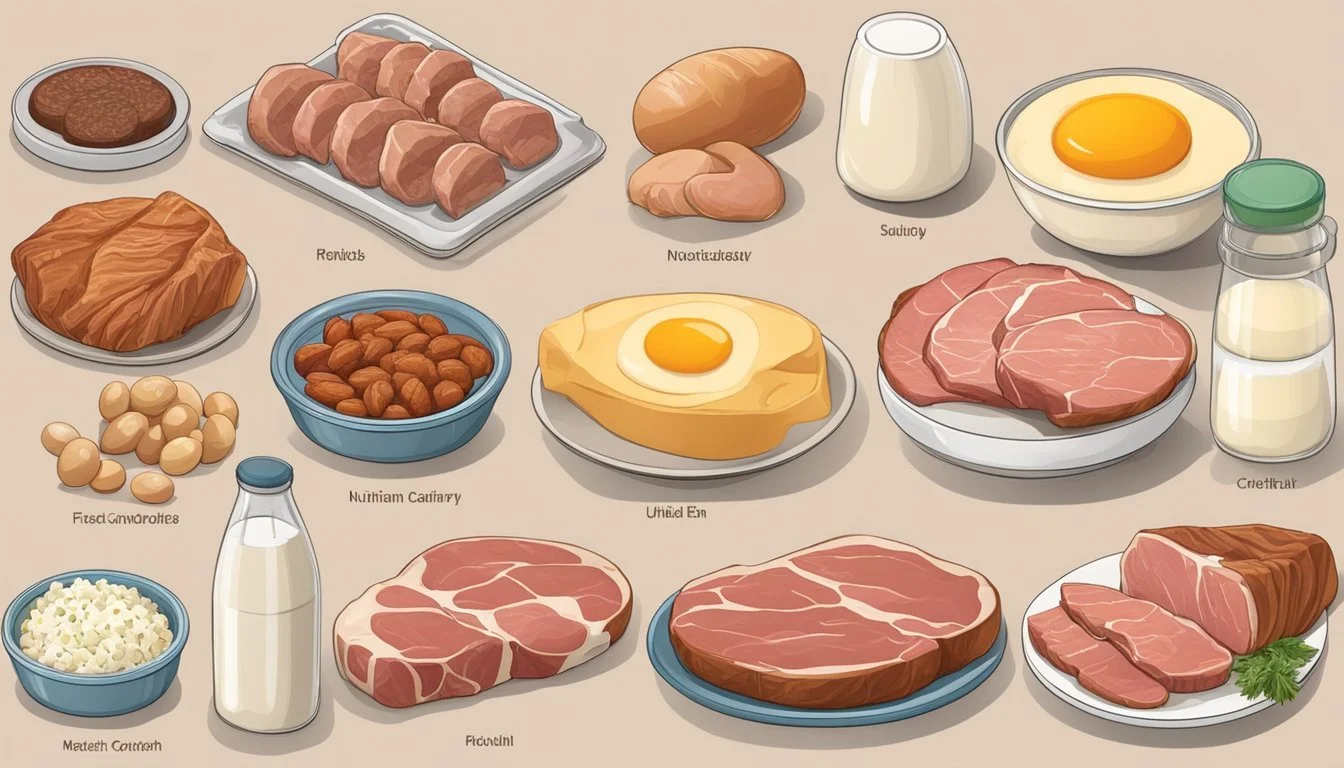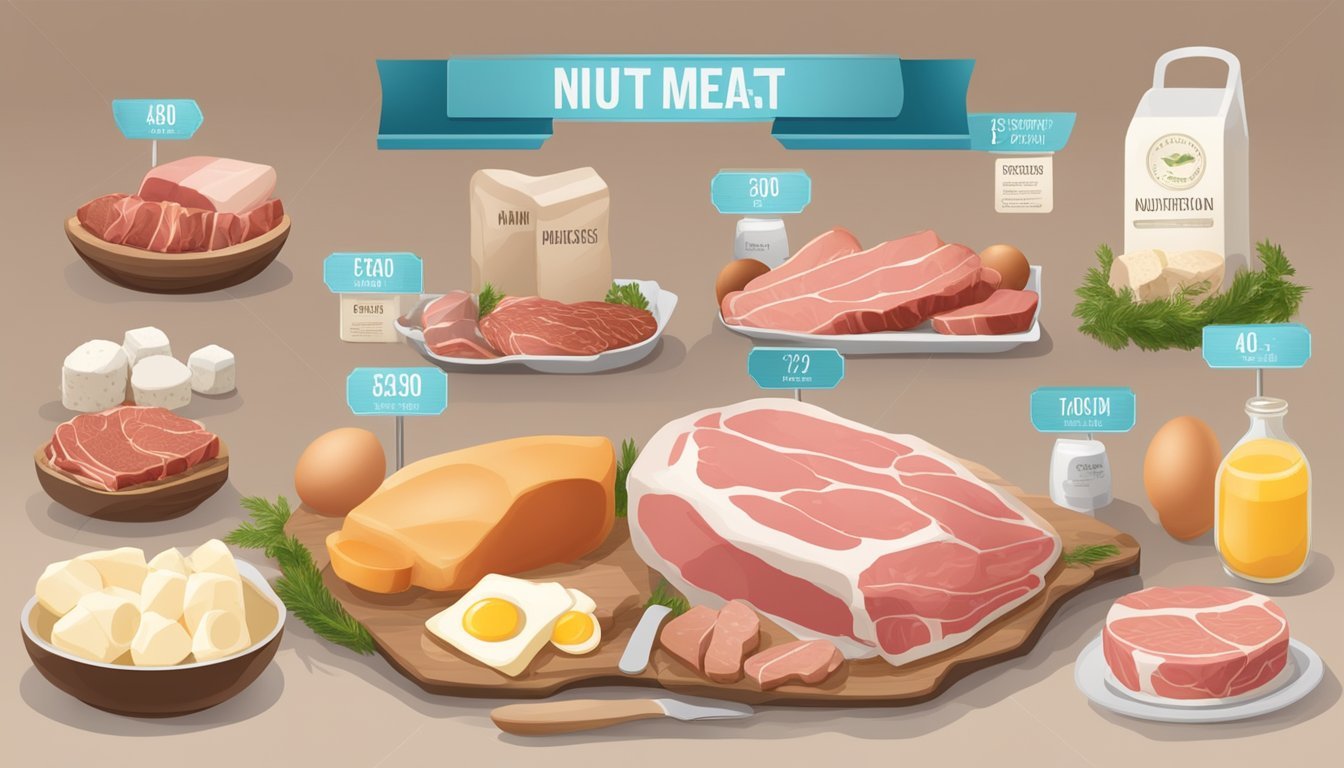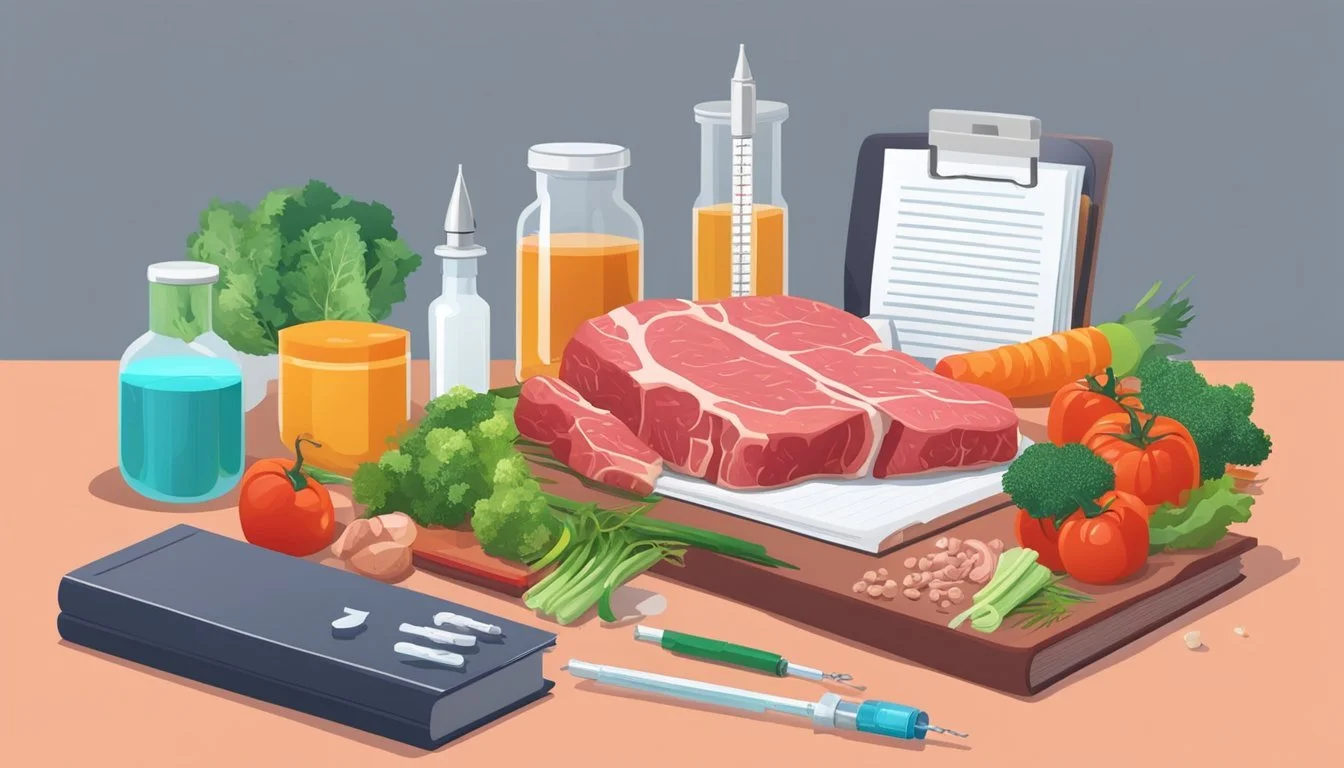Carnivore Diet vs. The HCG Diet
Evaluating Two Controversial Weight Loss Strategies
The Carnivore Diet and the HCG Diet are two distinctive dietary protocols that have garnered attention for their weight loss claims. The Carnivore Diet, as an all-animal product regimen, advocates for the consumption of meats, fish, eggs, and certain dairy products, while completely eliminating plant-based foods. Proponents suggest that mimicking the dietary patterns of early human ancestors can lead to improvements in health and facilitate weight loss.
In contrast, the HCG Diet marries the use of Human Chorionic Gonadotropin (HCG) hormone supplements or injections with a severely restricted calorie intake, often as low as 500 calories a day. Structured in phases for short-term adherence, this diet has been promoted as a means to achieve rapid weight loss over a period of three to six weeks. Critics, however, have raised concerns about the potential health risks associated with the diet’s extreme caloric limitation.
Although both diets are aimed at those seeking weight loss, they propose markedly different approaches: one through a specific hormone and calorie restriction, and the other through an exclusive focus on animal-derived food sources. These contrasting strategies highlight the diversity of weight loss methodologies available and the importance of understanding both the benefits and the potential drawbacks before adopting any such diet.
Understanding The Carnivore Diet
The Carnivore Diet strictly focuses on animal products and excludes other food groups, creating a unique approach to nutrition that has become a subject of both interest and controversy.
Fundamentals of the Carnivore Diet
The Carnivore Diet is characterized by the consumption of exclusively animal-based foods. It typically includes:
Meat: Beef, pork, lamb, and game
Poultry: Chicken, turkey, and duck (What wine goes well with duck?)
Fish: Salmon, mackerel, and sardines
Eggs: Chicken, duck, and quail (What wine goes well with quail?) eggs
Dairy: High-fat dairy like butter and certain cheeses
This diet eliminates plant-based foods, focusing on protein and fat as primary energy sources. Proponents suggest that the absence of carbohydrates can lead to various health benefits.
Benefits and Challenges
Advocates claim the following benefits:
Weight Loss: Due to high satiety from protein and fat
Improved Mood and Mental Clarity: Possibly from stabilizing blood sugar levels
Simplified Diet Choices: No need to count calories or balance food groups
However, there are considerable challenges:
Nutritional Deficiencies: Risk due to the lack of plant-based nutrients
Increased Saturated Fat: Potential impact on heart health
Social and Lifestyle Constraints: Limited meal options when dining out
It is generally recommended to consult a healthcare provider before adopting such a restrictive diet since one size does not fit all in nutrition.
Carnivore Diet and Weight Loss
The Carnivore Diet's approach to weight loss hinges on high protein intake, which can lead to increased satiety and, consequently, a natural reduction in overall calorie consumption. Moreover, the absence of carbohydrates means the body may enter a state of ketosis, potentially increasing fat burn. Nonetheless, individual responses can vary, and long-term impacts on health are a subject of ongoing research. It's crucial to approach weight loss under the guidance of a healthcare professional.
Examining the HCG Diet
The HCG Diet is recognized for its combination of hormone injections and severe caloric limitation aimed at rapid weight loss.
Principles of the HCG Diet
The foundation of the HCG Diet involves the administration of human chorionic gonadotropin (HCG), a hormone naturally produced during pregnancy. Individuals on this diet follow a meticulously outlined program that operates in distinct phases, starting with an extremely low-calorie diet often ranging between 500 to 800 calories per day. Registered dietitians typically scrutinize this diet due to the risks associated with such extreme calorie restriction.
Potential Advantages and Drawbacks
Advantages:
Rapid weight loss: Proponents claim it can result in significant loss in a short period.
Structured plan: The diet's strict guidance may help some people stay on track.
Drawbacks:
Nutritional deficiencies: The diet's limited caloric intake can lead to deficiencies.
Metabolic concerns: Long-term calorie restriction may potentially lower metabolism.
Regulation: HCG for weight loss is not FDA approved and requires prescription.
HCG Diet's Approach to Shedding Pounds
The central approach to weight loss in the HCG Diet focuses on daily injections of HCG coupled with an intake of only 500 to 800 calories per day. This strategy implies that the hormone can aid in losing pounds by affecting appetite and facilitating fat utilization while retaining muscle mass. However, evidence to support these claims is insufficient, and health professionals advise caution, emphasizing the importance of sustainable, balanced diets and exercise for long-term weight management.
Comparing Nutritional Profiles
When examining the nutritional profiles of the Carnivore Diet and the HCG Diet, it's essential to discuss their composition in terms of macronutrients, impact on heart health through dietary fats, and the role of fiber and carbohydrates.
Macronutrients and Vitamins
The Carnivore Diet is primarily composed of animal products, which makes it rich in protein and certain fats, but lacking in fiber and carbohydrates. Vitamins that are abundant in animal products, such as B vitamins and fat-soluble vitamins A, D, E, and K, are present. In contrast, the HCG Diet restricts calories drastically and can result in a less diverse intake of nutrients. It relies on the hormone HCG and a very low-calorie intake, potentially leading to deficiencies in both macronutrients and micronutrients if not carefully managed.
Dietary Fats and Heart Health
A central concern for any diet is the impact on heart health, largely influenced by the type and amount of fat consumed. The Carnivore Diet includes a substantial intake of both saturated fats and cholesterol from animal products, which can be a concern for heart health. However, recent research has nuanced the view on the role of these fats in cardiovascular disease. Still, balance and individual health status should guide consumption. The HCG Diet, with its low-calorie approach, often results in lower total fat intake, but it also lacks the essential fatty acids, such as omega-3s, found in certain fish and needed for healthy heart function.
Significance of Fiber and Carbohydrates
Fiber plays a crucial role in digestion and metabolic health but is absent in the Carnivore Diet due to the exclusion of plant-based foods. This absence may lead to digestive issues or long-term health risks concerning colorectal health. This diet also forgoes carbohydrates, which are the body's primary energy source, potentially affecting energy levels and brain function. Alternatively, the HCG Diet is also low in fiber, as it is very restrictive in food variety. Carbohydrate consumption varies on the HCG Diet, depending on the phase, but it is usually lower than the standard dietary recommendations.
Impact on Health Conditions
Exploring the Carnivore and HCG diets reveals distinct influences on various health conditions, including metabolism, blood sugar levels, heart disease, and cancer risk.
Effects on Metabolism and Obesity
The Carnivore Diet is a high-protein, low-carbohydrate diet that may initially boost metabolism and reduce body weight due to the thermic effect of protein. Scientific evidence suggests that this diet can lead to short-term weight loss. However, concerns exist about its long-term effects on obesity due to the exclusion of certain food groups and potential nutrient deficiencies.
The HCG Diet, combining hormone injections with a very low-calorie intake, promises rapid weight loss. This diet's calorie restriction can result in temporary weight reduction, yet scientific evidence does not support its efficacy for sustainable long-term metabolism improvement or obesity management.
Influence on Diabetes and Blood Sugar
Consumption of high amounts of protein and fat on the Carnivore Diet may stabilize blood sugar levels, benefting individuals with diabetes. However, due to the lack of dietary fiber and other carbohydrates, the diet's long-term impact on insulin sensitivity and diabetes management remains questionable and largely unsupported by extensive research.
In contrast, the HCG Diet's severe calorie restriction can lead to an initial drop in blood sugar. Yet, the diet lacks substantiation through solid scientific evidence for improving diabetes beyond the weight loss phase, leading experts to question its safety and effectiveness.
Risks for Heart Disease and Cancer
Adherents to the Carnivore Diet might experience elevated cholesterol levels due to high saturated fat intake from animal products, which is linked to an increased risk of heart disease. The absence of plant-based antioxidants and fiber could also amplify the risk for certain cancers.
With the HCG Diet, the health risks mainly stem from nutrient imbalances caused by extreme calorie reduction. The diet's lack of variety fails to provide protective nutrients that may lower the risk of heart disease and cancer. However, no conclusive scientific evidence directly relates the HCG Diet to increased rates of these diseases.
Each diet's implications for health conditions such as obesity, diabetes, heart disease, and cancer highlight the necessity of considering long-term effects and scientific substantiation when evaluating weight loss protocols.
Side Effects and Health Risks
When evaluating weight loss strategies such as the Carnivore Diet and the HCG Diet, one must assess the potential side effects and health risks. Each diet comes with its unique set of concerns that can affect individuals differently, ranging from short-term discomfort to serious long-term health issues.
Short-Term and Long-Term Side Effects
Carnivore Diet:
Short-term: Individuals may experience elevated LDL cholesterol, which is linked to an increased risk of heart disease. Risks also include potential for fatigue and digestive discomfort due to the drastic change in diet.
Long-term: There's a possibility of increased cardiovascular disease risk from high saturated fat intake. Without plant-based foods, there is also a risk of missing out on fiber and certain vitamins, leading to longer-term health concerns.
HCG Diet:
Short-term: Side effects can include fatigue, irritability, and depression. Physical effects may encompass fluid buildup and swelling of breasts in males (gynecomastia).
Long-term: The diet's extreme calorie restriction could lead to muscle loss and metabolic slowdown, as well as inadequate nutrition over prolonged periods.
Nutrient Deficiencies and Diet Sustainability
Carnivore Diet:
Nutrient deficiencies, particularly in Vitamin C and certain minerals, can arise since plant-based foods are excluded.
The diet's focus on exclusively animal-based foods raises questions about its sustainability for health, as well as environmental considerations.
HCG Diet:
It involves an extremely low-calorie intake, which may not provide all the necessary nutrients for maintaining health, making it potentially unsustainable long-term.
The diet could lead to nutrient deficiencies due to its restrictive nature, limiting the intake of a diverse range of foods required for a well-rounded diet.
Consulting with Healthcare Providers
Individuals considering these diets should consult with healthcare providers to assess personal health risks.
Healthcare providers can offer guidance on mitigating potential side effects and managing nutrient deficiencies, tailored to the individual's health history and nutritional needs.
They are best positioned to monitor for any serious complications that may arise from either diet, such as depression or fatigue, and to suggest alternatives if these methods prove unsustainable or detrimental to health.
Lifestyle and Behavioral Considerations
Adhering to a diet is not only about the food choices; it encompasses a holistic approach that includes exercise habits, meal preparation, and the emotional aspects that come with dietary lifestyle changes. Each diet has unique implications for these factors.
Exercise and Physical Activity
The Carnivore Diet often requires no specific exercise regimen, yet exercise is recommended for overall health. Participants may focus on strength training to complement the high protein intake. The HCG Diet, with its severe calorie restriction, suggests low-intensity activities to match energy levels. Individuals should ensure adequate water intake during physical activity to stay hydrated.
Meal Planning and Daily Routines
Meal planning on the Carnivore Diet generally involves simpler preparation with a focus on meat-based meals for breakfast, lunch, and dinner. This diet allows for the consumption of coffee and tea, which can remain part of daily routines. In contrast, the HCG Diet involves strict calorie counting and potentially scheduled injections or supplements, often leading to more complex daily routines with a definitive focus on specific meal timings and portion sizes.
Emotional Well-Being and Social Support
A diet’s success is frequently linked to one's emotional state and the support system. Adherents to the Carnivore Diet may find social support in community groups, both online and offline, whereas individuals on the HCG Diet may need professional support due to the diet's intensity. Emotional well-being can be bolstered by adhering to a healthy sleep pattern, managing stress, and maintaining social interactions that respect dietary choices.
Practical Tips for Implementation
Successfully adhering to a new diet requires thoughtful planning and understanding of its principles. This section offers practical tips and reliable strategies to ensure individuals can implement the Carnivore and HCG diets safely and effectively.
Starting the Diet: Steps and Precautions
When beginning the Carnivore Diet, individuals should prioritize a variety of animal products such as eggs, chicken, and fish to ensure nutrient diversity. They may want to consider a gradual increase in these foods to monitor their body's response. It's essential to source high-quality proteins that are rich in nutrients. For those starting the HCG diet, it’s important to follow the initial high fat, high-calorie phase with the guidance of a nutrition expert to ensure safe and effective use of the hormone supplements.
Managing Cravings and Social Situations
Cravings often occur during diet transitions. For the Carnivore Diet, keeping ready-to-eat snacks such as hard-boiled eggs or precooked chicken can provide immediate satiety and deter off-plan eating. In social settings, planning ahead can make it easier to stick to the diet—opting for simple meat-based dishes when dining out. For the HCG diet, individuals can manage cravings by consuming approved foods in the prescribed manner and using oil-free cooking methods to adhere to the calorie restrictions.
Resources and Support Systems
Individuals should seek out online forums, local support groups, or consult with nutrition specialists for tailored advice. Many resources are available for diet-specific recipes, meal planning, and motivational stories. For the Carnivore Diet, integrating an online tracking tool may help keep track of protein and fat intake. The HCG diet participants might find expert-approved HCG meal guides and food lists helpful in sustaining the strict regimen required. It is critical to consult healthcare professionals before starting either diet to ensure they are appropriate choices for one’s health and lifestyle.
Conclusion: Making Informed Decisions
When comparing the Carnivore Diet and the HCG Diet, individuals should consider their personal health goals, dietary preferences, and medical history. Both diets present unique approaches to weight loss and come with their respective advantages and challenges.
The Carnivore Diet:
Focus: High protein and fat intake; nearly zero carbohydrates.
Eating Pattern: Typically involves fewer meals per day, often one to two, relying on hunger cues.
Consideration: Potential for weight loss and blood sugar regulation.
The HCG Diet:
Focus: Very low-calorie intake paired with HCG hormone supplementation.
Eating Pattern: Caloric intake is highly restricted for a duration of the diet.
Consideration: Can involve metabolic and thyroid concerns due to prolonged calorie restriction.
Before starting any weight loss protocol, it is imperative to consult a healthcare provider to evaluate the safety and suitability of the diet for an individual's specific health needs. The healthcare provider can provide support and guidance, ensuring that the chosen diet does not jeopardize one's well-being.
Individuals should weigh the pros and cons, considering sustainability, nutritional adequacy, and potential health risks. Empowered with information and professional guidance, people can make informed decisions about incorporating, modifying, or avoiding certain weight loss protocols.







